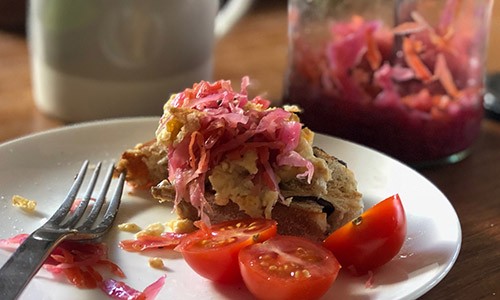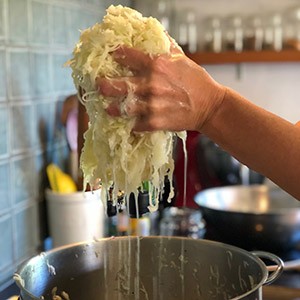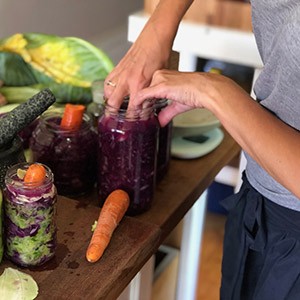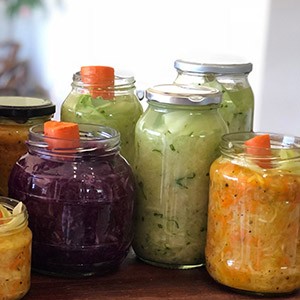 I’ve been doing a whole lot of fermenting over the summer break. It’s been loads of fun and I’ve ended up with something that’s excellent for gut health and super tasty. What’s not to love?
I’ve been doing a whole lot of fermenting over the summer break. It’s been loads of fun and I’ve ended up with something that’s excellent for gut health and super tasty. What’s not to love?
If you’ve been in for a treatment here at Quiescence it’s likely you would have heard us preaching the importance of improving gut health. Incorporating fermented foods, along with bone broth, into your diet is a simple way of doing just that.
While bone broth does wonders for reducing inflammation and healing the gut wall, fermented foods act as pro-biotics putting the good bacteria back in.
Fermentation is a traditional food preservation method that us humans have been practicing for centuries. In fact the earliest record of alcoholic fermentation dates as far back at 7000 BCE. That’s a long time ago! Since then we’ve come a long way and now have a wide variety of fermented foods from all over the world to choose from. We have yogurt, cheese and sourdough breads, sauerkraut, kimchi and pickles, kefier and kombucha, dosa, miso, soy sauce, tofu and temphe and even fermented fish just to name a few. It seems that almost every traditional society has fermented something at some time.
 During the fermentation process natural bacteria (think pre-biotics) feed on the sugar and starches in the food creating lactic acid. This process preserves the food and creates an host of beneficial enzymes, b-vitamins and pro-boitics. It also has the added benefit of making the food easier for our bodies to digest.
During the fermentation process natural bacteria (think pre-biotics) feed on the sugar and starches in the food creating lactic acid. This process preserves the food and creates an host of beneficial enzymes, b-vitamins and pro-boitics. It also has the added benefit of making the food easier for our bodies to digest.
You’ll notice that fermented foods all have an element of sour flavour. This makes it excellent for cutting through fats, aiding the digestion of richer foods. In Chinese Medicine it is said that the sour flavour relates to the Wood element and effects the Liver and Gallbladder energetic. Read more about it here!
We are lucky living in Melbourne having access to fabulous quality food and food products, so its pretty easy these days to get a great sauerkraut or kombucha from your local store. Just keep in mind to get the full pro-biotic benefit of these foods they need to be living. Check the label carefully before buying, make sure it hasn’t been pasturised, or better still, make your own. Here’s a recipe to get you started.
How to Make Sauerkraut
You Will Need: A big mixing bowl, sharp knife, a bunch of clean old jars, cabbage and salt. That’s it. If you want to get adventurous you can add your own spices and throw in a different vegetable or two, just keep in mind the amount of salt you need is 1.5 – 2.5% of the weight of cabbage/vegetables.
This means if you have 1kg of cabbage you’ll need 20-25g of salt. It’s a good idea to weigh your cabbage before you start slicing to work out how much salt you need. 1kg of cabbage will fill a 1L jar. If you’re adding another vegetable keep the cabbage at at least 75% of the mix.
METHOD:

Put aside an outer leaf of the cabbage and cut out the thick stem.
Weigh your cabbage and work out the amount of salt you need.Thinly slice or shred the cabbage and cover with salt.
Make sure your glass jars are clean and dry.
Massage the salt through the cabbage until the cabbage releases it’s juices and lots of salty brine drips from your hands when you pick it up.
Add your spices and/or other grated or thinly sliced vegetables and mix through well (1tsp caraway seeds to 1kg cabbage is a traditional spicing).
Pack the mix into your jars. Make sure you pack it in really tightly getting rid of any air bubbles leaving a couple of centimetres at the top. The brine should be covering the top of the cabbage.
Take a piece of the outer leaf and push it down on top of the cabbage, pack it in close to the edges of the jar making sure everything is well covered to create a seal. You’ll have a bit of brine flowing over the top. If there’s a lot, pour some off, you don’t want it touching the lid.
 Now you need to hold it all down, so take the stem of the cabbage or cut a piece of a strong root vegetable, carrot works well. Cut it so it fits tightly between the lid and outer leaf. Pop the lid on and clean the outside of the jar.
Now you need to hold it all down, so take the stem of the cabbage or cut a piece of a strong root vegetable, carrot works well. Cut it so it fits tightly between the lid and outer leaf. Pop the lid on and clean the outside of the jar.
Sit the jars in a tray or bowl on the bench for at least two weeks. You’ll need to ‘burp’ it daily by just opening and closing the lid. This allows the gasses to escape and reduces the amount of juice that overflows. You can get special weight, airlocks systems or crocks if you want to get technical about it, but I find this works a treat.
After 10 day’s to two weeks taste your sauerkraut, it should be crunchy, salty and sour. If you like a stronger sour flavour just leave it out for longer, otherwise pop in in the fridge. It should keep for up to a year but I doubt it will last that long!

For an immune boosting kick add 2cm of grated ginger, 1cm of grated turmeric and 1tsp of crushed pepper for every 1kg of cabbage. Pop in a couple of grated carrots for a bit of colour.
Or for a super refreshing summer twist add 2tbsp of lemon rind, a handful of garden mint roughly chopped and a large cucumber grated.





